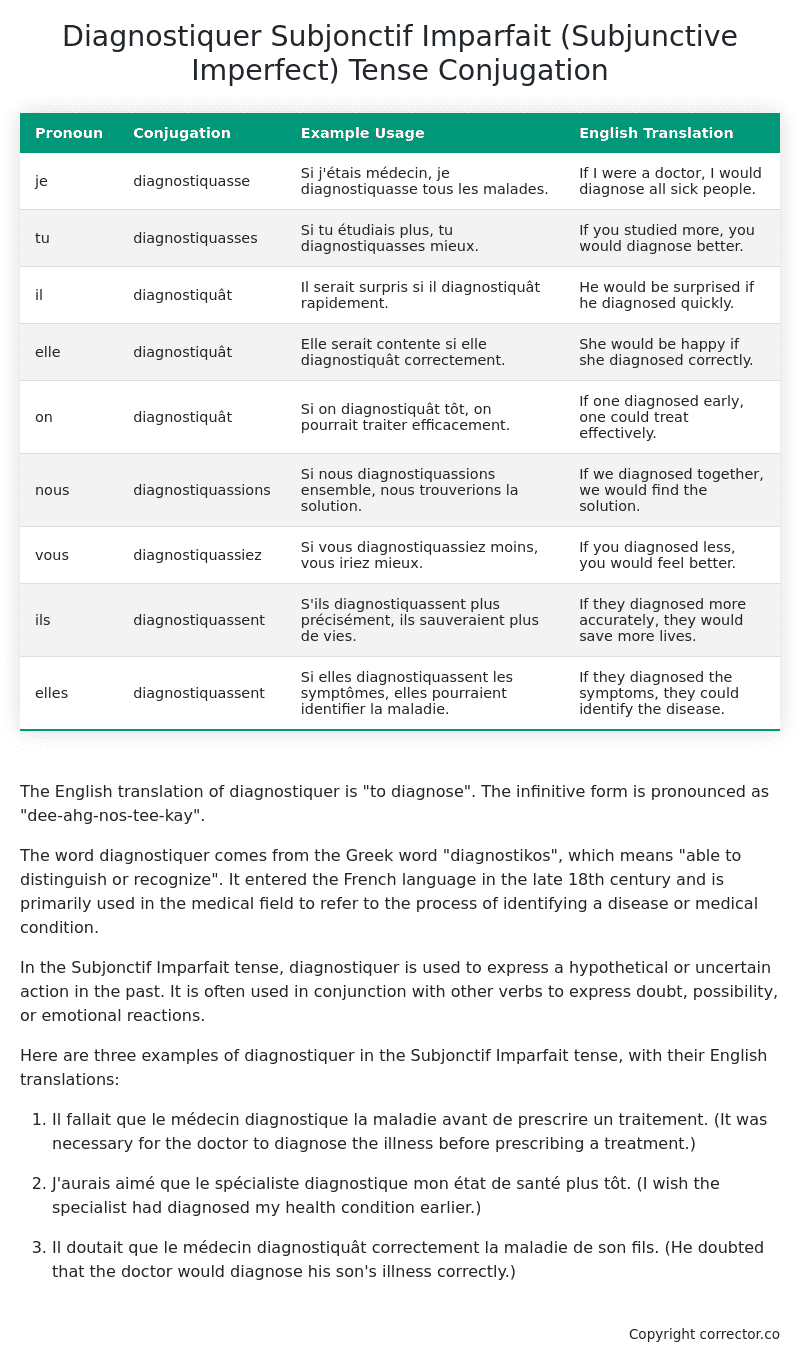Subjonctif Imparfait (Subjunctive Imperfect) Tense Conjugation of the French Verb diagnostiquer
Introduction to the verb diagnostiquer
The English translation of diagnostiquer is “to diagnose”. The infinitive form is pronounced as “dee-ahg-nos-tee-kay”.
The word diagnostiquer comes from the Greek word “diagnostikos”, which means “able to distinguish or recognize”. It entered the French language in the late 18th century and is primarily used in the medical field to refer to the process of identifying a disease or medical condition.
In the Subjonctif Imparfait tense, diagnostiquer is used to express a hypothetical or uncertain action in the past. It is often used in conjunction with other verbs to express doubt, possibility, or emotional reactions.
Here are three examples of diagnostiquer in the Subjonctif Imparfait tense, with their English translations:
-
Il fallait que le médecin diagnostique la maladie avant de prescrire un traitement. (It was necessary for the doctor to diagnose the illness before prescribing a treatment.)
-
J’aurais aimé que le spécialiste diagnostique mon état de santé plus tôt. (I wish the specialist had diagnosed my health condition earlier.)
-
Il doutait que le médecin diagnostiquât correctement la maladie de son fils. (He doubted that the doctor would diagnose his son’s illness correctly.)
Table of the Subjonctif Imparfait (Subjunctive Imperfect) Tense Conjugation of diagnostiquer
| Pronoun | Conjugation | Example Usage | English Translation |
|---|---|---|---|
| je | diagnostiquasse | Si j’étais médecin, je diagnostiquasse tous les malades. | If I were a doctor, I would diagnose all sick people. |
| tu | diagnostiquasses | Si tu étudiais plus, tu diagnostiquasses mieux. | If you studied more, you would diagnose better. |
| il | diagnostiquât | Il serait surpris si il diagnostiquât rapidement. | He would be surprised if he diagnosed quickly. |
| elle | diagnostiquât | Elle serait contente si elle diagnostiquât correctement. | She would be happy if she diagnosed correctly. |
| on | diagnostiquât | Si on diagnostiquât tôt, on pourrait traiter efficacement. | If one diagnosed early, one could treat effectively. |
| nous | diagnostiquassions | Si nous diagnostiquassions ensemble, nous trouverions la solution. | If we diagnosed together, we would find the solution. |
| vous | diagnostiquassiez | Si vous diagnostiquassiez moins, vous iriez mieux. | If you diagnosed less, you would feel better. |
| ils | diagnostiquassent | S’ils diagnostiquassent plus précisément, ils sauveraient plus de vies. | If they diagnosed more accurately, they would save more lives. |
| elles | diagnostiquassent | Si elles diagnostiquassent les symptômes, elles pourraient identifier la maladie. | If they diagnosed the symptoms, they could identify the disease. |
Other Conjugations for Diagnostiquer.
Le Present (Present Tense) Conjugation of the French Verb diagnostiquer
Imparfait (Imperfect) Tense Conjugation of the French Verb diagnostiquer
Passé Simple (Simple Past) Tense Conjugation of the French Verb diagnostiquer
Passé Composé (Present Perfect) Tense Conjugation of the French Verb diagnostiquer
Futur Simple (Simple Future) Tense Conjugation of the French Verb diagnostiquer
Futur Proche (Near Future) Tense Conjugation of the French Verb diagnostiquer
Plus-que-parfait (Pluperfect) Tense Conjugation of the French Verb diagnostiquer
Passé Antérieur (Past Anterior) Tense Conjugation of the French Verb diagnostiquer
Futur Antérieur (Future Anterior) Tense Conjugation of the French Verb diagnostiquer
Subjonctif Présent (Subjunctive Present) Tense Conjugation of the French Verb diagnostiquer
Subjonctif Passé (Subjunctive Past) Tense Conjugation of the French Verb diagnostiquer
Subjonctif Imparfait (Subjunctive Imperfect) Tense Conjugation of the French Verb diagnostiquer (this article)
Conditionnel Présent (Conditional Present) Tense Conjugation of the French Verb diagnostiquer
Conditionnel Passé (Conditional Past) Tense Conjugation of the French Verb diagnostiquer
L’impératif Présent (Imperative Present) Tense Conjugation of the French Verb diagnostiquer
L’infinitif Présent (Infinitive Present) Tense Conjugation of the French Verb diagnostiquer
Struggling with French verbs or the language in general? Why not use our free French Grammar Checker – no registration required!
Get a FREE Download Study Sheet of this Conjugation 🔥
Simply right click the image below, click “save image” and get your free reference for the diagnostiquer Subjonctif Imparfait tense conjugation!

Diagnostiquer – About the French Subjonctif Imparfait (Subjunctive Imperfect) Tense
Formation
Common Everyday Usage Patterns
Interactions with Other Tenses
Subjonctif Présent
Indicatif Passé Composé
Conditional
Conditional Perfect
Summary
I hope you enjoyed this article on the verb diagnostiquer. Still in a learning mood? Check out another TOTALLY random French verb conjugation!


